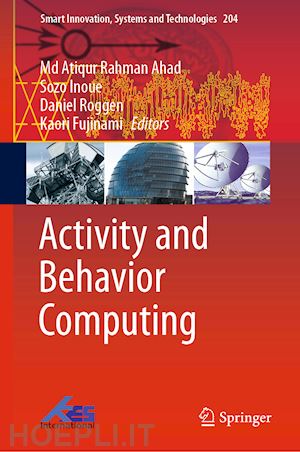
Questo prodotto usufruisce delle SPEDIZIONI GRATIS
selezionando l'opzione Corriere Veloce in fase di ordine.
Pagabile anche con Carta della cultura giovani e del merito, 18App Bonus Cultura e Carta del Docente
Focusing on the vision-based and sensor-based recognition and analysis of human activity and behavior, this book gathers extended versions of selected papers presented at the International Conference on Activity and Behavior Computing (ABC 2020), held in Kitakyushu, Japan on August 26 – 29, 2020. The respective chapters cover action recognition, action understanding, gait analysis, gesture recognition, behavior analysis, emotion and affective computing, and related areas. The book addresses various challenges and aspects of human activity recognition in both the sensor-based and vision-based domains, making it a unique guide to the field.
Md Atiqur Rahman Ahad, Ph.D., SMIEEE, is a Professor of Electrical & Electronic Engineering, University of Dhaka (DU). He is currently working as specially appointed Associate Professor at Osaka University, Japan. He did B.Sc.(honors) & Masters from the Department of Applied Physics & Electronics, DU; Masters from the School of Computer Science & Engineering, University of New South Wales; and Ph.D. from the Faculty of Engineering, Kyushu Institute of Technology [KIT]. He was awarded prestigious UGC Gold Medal (handed by Honorable President of Bangladesh in 2018), JSPS Postdoctoral Fellowship, and a no. of awards. He was a Visiting Researcher at KIT. He published 3 authored books and several edited book (available in Springer), ~150 journals and conference papers. Ahad was invited as keynote/invited speakers ~70 times in different conferences/universities. He has been involved with some academic & editorial activities: e.g., Editorial Board Member, Scientific Reports, Nature; Associate Editor, Frontiers in Computer Science; Editor, International Journal of Affective Computing; Associate Technical Editor (former), IEEE ComSoc Magazine; Editor-in-Chief: International Journal of Computer Vision & Signal Processing; General Chair, 2020 9th International Conference on Informatics, Electronics & Vision, Japan; 4th International Conference on Imaging, Vision & Pattern Recognition, Japan ; 2nd International Conference on Activity & Behavior Computing, 2020 ; Workshop Chair, 17th IEEE PiCom; Publication Chair, 2018 IEEE International Conference on Systems, Man, and Cybernetics (SMC); Vice Publication Co-Chair and Vice Award Chair, Joint 17th World Congress of International Fuzzy Systems Association (IFSA) and 9th International Conference on Soft Computing and Intelligent Systems; General Chair, 7th International Symposium in Computational Medical and Health Technology; and several other international conferences. He served as Guest Editor in Pattern Recognition Letters, Elsevier; Journal of Multimedia User Interface, Springer; Journal of Healthcare Engineering, Hindawi; International Journal of Innovative Computing, Information and Control. Ahad is a member of OSA, ACM, IAPR, etc.
Sozo Inoue, Ph.D., is a Professor in Kyushu Institute of Technology, Japan. His research interests include human activity recognition with smart phones and healthcare application of web/pervasive/ubiquitous systems. Currently, he is working on verification studies in real field applications, and collecting and providing a large-scale open dataset for activity recognition, such as a mobile accelerator dataset with about 35,000 activity data from more than 200 subjects, nurses’ sensor data combined with 100 patients’ sensor data and medical records, and 34 households’ light sensor dataset for 4 months combined with smart meter data. Inoue has a Ph.D. of Engineering from Kyushu University in 2003. After completion of his degree, he was appointed as an Assistant Professor in the Faculty of Information Science and Electrical Engineering at the Kyushu University, Japan. He then moved to t the Research Department at the Kyushu University Library in 2006. Since 2009, he is appointed as an Associate Professor in the Faculty of Engineering at Kyushu Institute of Technology, Japan, and moved to Graduate School of Life Science and Systems Engineering at Kyushu Institute of Technology in 2018. Meanwhile, he was a Guest Professor in Kyushu University, a Visiting Professor at Karlsruhe Institute of Technology, Germany, in 2014, a special Researcher at Institute of Systems, Information Technologies and Nanotechnologies (ISIT) during 2015–2016, and a Guest Professor at the University of Los Andes in Colombia in 2019. He is a Technical Advisor of Team AIBOD Co. Ltd. since 2017 and a Guest Researcher at RIKEN Center for Advanced Intelligence Project (AIP) since 2017. He is a member of the IEEE Computer Society, the ACM, the Information Processing Society of Japan (IPSJ), the Institute of Electronics, Information and Communication Engineers (IEICE), the Japan Society for Fuzzy Theory and Intelligent Informatics, the Japan Association for Medical Informatics (JAMI), and the Database Society of Japan (DBSJ).
Daniel Roggen, Ph.D., received the master’s and Ph.D. degrees from the École Polytechnique Fédérale de Lausanne, Switzerland, in 2001 and 2005, respectively. He is currently an Associate Professor with the Sensor Technology Research Centre, University of Sussex, where he leads the Wearable Technologies Laboratory and directs the Sensor Technology Research Centre. His research focuses on wearable and mobile computing, activity and context recognition, and intelligent embedded systems. He has established a number of recognized datasets for human activity recognition from wearable sensors, in particular the opportunity dataset. He is a member of Task Force on Intelligent Cyber-Physical Systems of the IEEE Computa











Il sito utilizza cookie ed altri strumenti di tracciamento che raccolgono informazioni dal dispositivo dell’utente. Oltre ai cookie tecnici ed analitici aggregati, strettamente necessari per il funzionamento di questo sito web, previo consenso dell’utente possono essere installati cookie di profilazione e marketing e cookie dei social media. Cliccando su “Accetto tutti i cookie” saranno attivate tutte le categorie di cookie. Per accettare solo deterninate categorie di cookie, cliccare invece su “Impostazioni cookie”. Chiudendo il banner o continuando a navigare saranno installati solo cookie tecnici. Per maggiori dettagli, consultare la Cookie Policy.